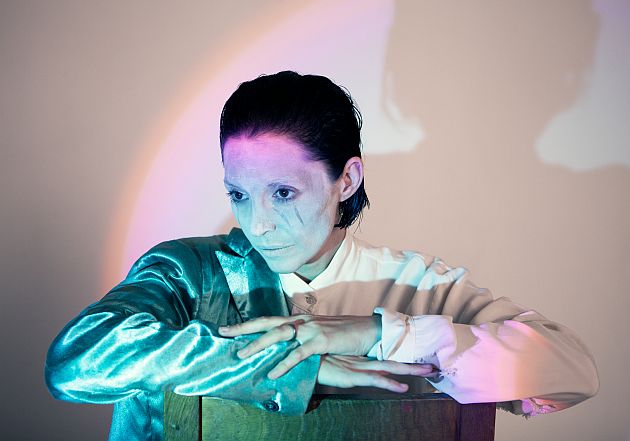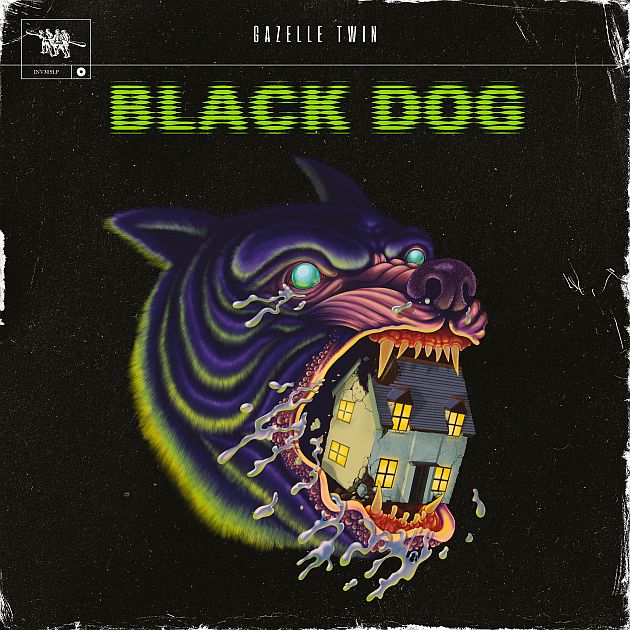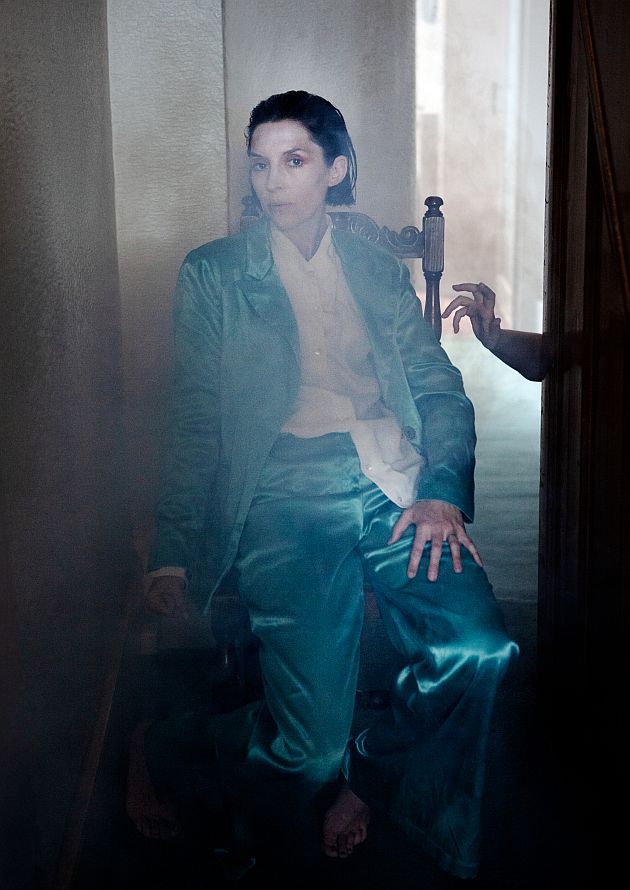 Interview with
Interview with Elizabeth Bernholz (vocals) from Gazelle Twin
Elizabeth Bernholz, known as GAZELLE TWIN, is a prominent electronic music composer, producer, and musician from England. Born in 1981 in Canterbury, she studied music at the University of Sussex and launched GAZELLE TWIN after being inspired by FEVER RAY’s performance in 2009. Her debut album, ‘The Entire City,’ released in 2011, received critical acclaim, featuring previously recorded singles like ‘Changelings’ and ‘I Am Shell I Am Bone.’
In 2014, GAZELLE TWIN released ‘Unflesh,’ her second album, which continued to receive critical praise. She explored the concept of identity through her live shows, performing in a version of her PE kit from school to embody the idea of being a “freak” from her teenage years. Her third studio album, ‘Pastoral,’ was released in 2018, inspired by rural life and Brexit. It topped The Quietus’ “Top 100 Albums of 2018” list. GAZELLE TWIN operates independently under her label, Anti-Ghost Moon Ray, and has also released music through various other labels. Her music is an absolutely stunning and mesmerizing mix of contrastive layers that leaves no one indifferent. On the occasion of the release of her brand-new album ‘Black Dog’ she kindly agreed to answer a few questions; not only about the album itself and future plans but also about fears, facing them and the philosophy behind her art. Dive in and find out what black dog stands for.
Reflections of Darkness [RoD]: Hello Elizabeth, thank you for taking the time for our interview. After listening to ‘Black Dog’ I was both impressed by the mastery of the sonic aspect and captivated by the content. In fact, on the first listen, I sensed that it’s one of the darkest and fear-filled releases in your discography. Do you believe that with each subsequent release, starting with ‘The Entire City’ demo in 2010, you’ve been delving further into the realms of fears, anxieties, and nightmares?
Elisabeth: I think that could be true. As I’ve found more and more flow with my composition and production style, and been free enough to realise them without restriction, I’ve grown in confidence. I’ve always wanted the themes of my music to be universal, but also vast and emotional. Certainly, after I made ‘Unflesh’ in 2014, which wasn’t planned but ended up being an album that confronted body dysmorphia and teenage anxiety, I found a groove in the process of catharsis of facing my personal demons, and fears - the negative, dark things that can attach to us in our formative years and which make or break us. I feel like every album I’ve made is some kind of dual with a part of myself / the world that I need to fight back on.
RoD: Looking at the cover of ‘Black Dog’ - a large, menacing beast showing its teeth, engulfing a warmly lit, kind house - it seems to symbolize childhood fears, the unfamiliar figure, a wolf, a dog, simultaneously crushing the peaceful, idealized place of rest. Is it a representation of some inner fears, reminiscences? Tell me more about the concept of ‘Black Dog.’ What is the main narrative and story behind the album?
Elisabeth: When home becomes an agent for fear and unrest, then your sense of safety quickly becomes fraught with doubt. Most things do scare us as children, that’s how we learn to be safe. And we learn to live with that fear and realise that most of the time it is irrational. But when it is something tangible, then I think it changes you forever. I don’t really know why, but in this first home of mine, there was just a bad feeling, a feeling that something wasn’t right. I had many nightmares. And so did my three siblings. We often had the same dream of flying down the stairs. I felt watched as I slept in the room I shared with my older sister. I would run to my parent’s room in the night and whilst in bed with them I would see the shadow of a small black dog by the bedside. Shifting around. Although the cover art for ‘Black Dog’ shows a hell hound, the shadow dog itself was not scary. It was more like a pet, sniffing around, restless and perhaps curious about me. It was a deeply recessed memory that I hadn’t recalled until I was much older and other family members talked about the same ghost dog, in much more detail. I traced this early memory, the feeling of the house being ill at ease, through the rest of my life until now, traversing depression and anxiety in teen hood and adulthood, and reaching a climax after becoming a parent. The Black Dog has two meanings - the black shadow dog of my childhood, the trigger of an experience of a world that feels uncanny, and also the black dog of depression.

RoD: Do you think we are all products of our pasts? Is it possible to transform ourselves, shedding the skin marked by our parents, school, or situations where we were too weak to defend ourselves or simply helpless? Have you experienced moments when you felt on the verge of being consumed by the symbolical “darkness”?
Elisabeth: Yes. Our early years, childhood and teenhood shape everything to come. If those years have been disrupted by anxiety, big change, trauma, fear etc then I believe those things live with us always, unless we recognise them and unravel their effects on us. After I became a parent the hormonal shifts together with sleep deprivation took their toll on my mental health and I experienced depression like I’ve never done before. I honestly felt as though I had been lowered into a pitch black well, and was trapped. I felt as though someone had possessed me. I sought help and unravelled many things that really helped me but I will likely always be prone to sinking deep. The world is not an easy one to live in, regardless of our mental health. It’s a constant battle.
RoD: What has always delighted me in your music is your use of minimal, maximally saturated effects to achieve maximum impact. This approach, devoid of pathos or exaggeration, focuses on pure forms that provoke thought and resonate deeply. ‘Black Dog’ feels like a play with conventions, from tunes reminiscent of childhood games or lullabies like ‘Sweet Dream’ and ‘The Long Room’ to contrasting, powerful, anxious pieces like the title track or ‘Walk Through the Walls.’ Do you like operating with contrasts?
Elisabeth: Thank you. I like music to be lean and straight to the point most of the time. I also like to create powerful or uneasy moods and atmospheres that are part of a wider narrative. I approach albums like films, the music often comes last, the ideas, moods, colours, settings, textures and feelings are the things that I spend more time working through before I make any music. I like there to be a fair balance between the light, dark, the sweet, the scary and the stuff that feels angry or gentle, so yes, I really enjoy contrasting things in the way a classic painter might adopt the chiaroscuro method!
RoD: ‘Two Worlds’ explores the theme of grief. How do you perceive the way to overcome grief?
Elisabeth: No, it’s not about grief, well not bereavement grief anyway. I wrote ‘Two Worlds’ to express conflicting mental states. There’s a domestic setting to this track, and a sense of cabin fever. But it’s about being unable to exist in one early defined way, because the mind has other ideas and divergences. I actually think this song is about me trying to get to grips with undiagnosed ADHD. I also wrote this with a symbolic parallel in mind, that this type of mental state is also akin to how a ghost might feel, trapped in a building for eternity, trying to move one, but unable to get beyond a certain threshold.
RoD: While I haven’t had the chance to see you perform live, recordings from festivals like Supersonic or the recent UK tour showcase your intense stage presence. What do live shows mean to you, and how important is the connection with the audience? Is the theatricality of your stage presence an important element, and how do you decide its arrangement?
Elisabeth: I like live shows to be quite raw and minimal. I prefer to do things simply, and focus on the vocal and physical delivery of the songs, lyrics, and to be able to be free to move around and engage the audience when I feel it’s necessary. I’ve always toured very minimally and simply. I have always had to operate on a budget but that simplicity has become a really effective setup. With ‘Black Dog’, the staging was more important because the music was less beat-driven and more about mood and atmosphere, so I worked with visuals artist Dan Conway to create live visuals and lighting that would reflect the moods of the album and enable me to perform something cinematic. The staging also features an armchair and floor lamp to create a more domestic sense. I am also alluding to the role of a spiritual medium at a seance. The most important thing for me with live shows is that the music has a chance to spark a new type of resonance with a live audience - it’s a magic, alchemical process that is different every venue, every show. I also like to feel able to sing at my best and so try not to give myself too much to do. I want the audience to feel immersed in visual world, like they would if they were sitting in a cinema or at the theatre.

RoD: On ‘Black Dog,’ you finally appear unmasked. Does this signify you’ve found the courage to confront things that hurt or scare you?
Elisabeth: It’s less to do with confidence and courage, and more to do with how the visual representation works with the themes of the record. In ‘Black Dog’, it is so much about my childhood, my emotional states, regret, confrontation, and self-awareness and a lot of these emotions are still very raw, so having a costume wouldn’t have been relevant. I love what costume and masks can do for performance and how to transform in performance and delivery. They hold a transfigurative power that taps into something ancient, but sometimes, no mask has power too.
RoD: Wearing many hats - composer, producer, singer, visual artist - which role resonates most closely with you? Currently touring in the UK to promote the new album, what can we expect from you in the upcoming months?
Elisabeth: Yes, there are a lot of hats, but that keeps me interested. Most of the time music is last on the list in terms of creative process, but it’s my most natural expressive tool, so naturally it’s always going to be the centre point of my creativity. I do love just focusing on visual worlds sometimes too. It’s a holiday for my brain. Right now, I am preparing for more touring in 2024, a theatrical show in collaboration at Factory International, Manchester in 2024, and some other releases in 2024 that are in the pipeline.
RoD: Thank you so much for your time!
Pictures by Teri Varhol




